tea in hanoi
Subscribe to the topic
Post new topic
I'm vacationing in Ha Noi now and would live to hear thoughts on tea here. I'm really into tea. I'll share some impressions to start but I'd like to hear more specifics, like a shop to visit or a brand to buy. I think I've already bought a few decent mid grade green teas, and one black, so I'd like to find at least one that's slightly better.
The most interesting I bought so far was in a local tribe mountain village near sapa. Of course black tea is also unusual here, and I sawone ooolong, but I couldn't know if it was any good without trying it. I've bought tea in Vietnam before and it's like what you get in shops, most similar to Japanese teas but not the same.
While I'm rambling, it seems odd the teas I've had here aren't made using either standard western or chinese methods. They put green tea in boiling water--when it's typical to use slightly cooler water for green tea to minimize the bitterness--and don't limit brewing time, so the result at first is ok but later quite bitter (or astringent; about the same thing).
:This is relevant to my interest:
Anyway, have you tried Thai Nguyen tea brand yet? They are teas grown from Thai Nguyen region.
There's a specific brand Tra dang (bitter tea) Thai nguyen I've been meaning to try. if you be a test subject first I would like to hear your impression.
I bought at least one tea sold as from there but I'm too busy to try the teas here, out touring all days.
To be honest bitter tea doesn't sound so good to me. I could just brew any green tea for 5 minutes in boiling water and it would already be really bitter. But then maybe it means something else. I bought an interesting sounding high mountain ancient tree tea on a trip to tamkok yesterday; I'll post how it is when I try it. I'd add pictures but these threads aren't set up to support that. I was also curious about shops on hang da we've walked past but I'm not sure I'll get to them today, my last day.
I'm back in Bangkok so the half dozen teas I bought will have to do. One is black, the rest green. I saw Vietnamese oolong, an intruiging sounding product, but without a chance to try it and no input I didn't get around to buying it.
Buying mediocre tea isn't so bad since I can still drink that or give it away but if it's bad I don't like to do either. I'll already be drinking all that green tea for months, which should be a good thing. It'll be something to write about in my tea blog, or I was thinking if switching the theme to a tea / travel hybrid blog.
Right around this intersection are a number of tea shops I didn't make it to. Guess I'll have to go back to Hanoi for that unfinished business.
45 Đường Thành
http://goo.gl/maps/G2Ysx
In case the link doesn't work it's where hang da meets durong thanh (missing some accent diacritics)
Oh there's plenty of great tea/coffee shops in Hanoi with terrible marketing and even Hanoians know less about them.
There must be hundreds of shops selling coffee with a few types of tea as well but I was only in one shop selling mostly tea, with a few big plastic jars of coffee as well.
If there isn't substantial local or tourist demand for better teas then it will be hard to find those teas anywhere, and even production of better grades will be limited. At least basic green teas in Vietnam are relatively good. It's a similar situation in Thailand: you can find decent mid grade Thai oolong different places, and since that's about all there is much demand for, it's not clear better versions even exist, although they must.
There's a teashop near my house, which serve ALL teas. Reviews say it's great quality tea though very pricey. Pity it's closed up one year ago, and no clue where it's moved to.
Marketing, especially online presence, Hanoians just dont have that aspect in reflex.
To remedy that, I should do something, I suppose
1. Tra Viet Quan
24 Doan Ke Thien, Cau Giay district
The watering place of Hanoi Viet Tea club. Snooty place.
2. Lu Tra
1st house: b6 Thanh Xuan Bac (terrible naming protocol, hard to find)
2nd house: also named Vo Thuong Tich Coc, 456 Hoang Hoa Tham street
Daily tea special. Strong tea. Street style and countryside style (bamboo chairs)
4. Hien Tra Truong Xuan
13 Ngo Tat To street, near Van Mieu Quoc Tu Giam
countryside style, Trinh music, great atmosphere more than great tea.
5. Viet Tra Dao
2nd floor, 6th Hang Bai
convenient to tourist around Old Quarter.
6. Thu Quan (book teahouse)
254 Lac Trung street, Hai Ba Trung district.
Some specific teas like honey teas, 8 treasure teas, or dragon eyes. Teas and books
7. Lang Chai Quan (fisherman village teahouse)
439 Lac Long Quan, Tay Ho district
It's on the small peninsula of West Lake. tel 84.04.7532752. red teas, rose teas, lotus teas, and fruity teas. might have english teas.
Great atmosphere.
8.Danh Tra (Famous Tea)
55 Phan Chu Trinh.
Quite famous among tea aficionado though I am not impressed.
9. Hoa Cuc Trang (white chrysanthemum)
28 Tang Bat Ho street.
36 Strange teas.
10. Tra Hoa Quan (tea flower house)
1st house: No 28 of Alley 28, Nguyen Hong Street.
Specific teas. More pricey than other place.
2nd house: 132 Bui Thi Xuan street
Even more pricey.
11. Hi Lac Tra Lau (chinese tea)
2nd floor, 30 Nguyen Hong street.
Chinese tea style. Chinese ingredient.
3. Tra QUan (Taiwan tea style)
3b Phan Dinh Phung street
boast of 158 teas.
Awesome input, thanks. Of course this won't help me since I'm back in Bangkok, and even if I was still there we were too busy with trips to places like Halong Bay for me to spend even a half day on tea. It already drives my wife crazy I keep spending a little here and there on it.
The challenge anywhere seems to be finding good tea at prices that aren't really high. Someone with a really loose budget might just want the best teas, but for most of us spending money on tea as if it's good wine doesn't work.
I know of two decent places for buying teas here, and one in Pataya, but it's hard to stumble onto such a place on a visit somewhere else.
I am certain that your requirement can be met, since the local demand is the same: great quality at low price. I am also equally certain they will have a terrible marketing effort to spread their presence online, since even a local like me cant name a specific brand to save my life.
Related to the earlier point of where tea shops are, this reference may be interesting, even though it doesn't cover Vietnam or any of Asia. It's an Adagio (private tea company) reference of lots of different tea shops. I don't know of the same type of thing for anywhere in Asia.
http://www.teamap.com/states/state_PA_Reviews.html
Related to your point about locals wanting great tea at good prices, I'm not so sure that's even relevant here in Thailand for most people. I know of a few people here that know a lot about Thai teas and different sourcing but almost all are tea vendors (only one isn't).
I can think of only four people that are very interested in tea that aren't vendors, only two of whom I've actually met, and half of them probably know very little about Thai teas in terms of specific farms or vendors.
I've been writing a blog about tea for over a year and have tried maybe two or three dozen Thai teas (many roughly the same thing, Jin Xuan cultivar oolong from the Doi Mae Salong growing area outside of Chiang Rai), but not many specific brands come to mind. I've known of two major farms and a government royal project that sells tea under related brands.
This could all be a comment on limited brand promotion but the larger context is that few people are interested in seeking out loose tea at all, never mind high quality tea. The traditional Chinese community is a different story, but even for them my understanding is that most loose teas offered and sold in Chinatown are conventional mid-grade. Based on my very limited experience in Vietnam most people here fall under the Chinese-Thai paradigm more than ethnic Thai-Thai; they like tea, and consume and know more about it than Thais, but don't take it to the next level.
In America and of course much more so in China there is greater awareness of sourcing better teas, different types at different quality levels. 10 years ago that would've been much less true in America--and the reference list of tea rooms I cited would have been shorter--but in terms of percentage of population it's still on the low side. Just as here far more people drink Lipton tea or bottled sweetened tea, which to a tea enthusiast might as well be a soda.
In Vietnam at least you can walk into a grocery store or restaurant and find a decent green tea, even if most people seem generally not aware of brands or brewing technique, from what I experienced even in a tea shop. For example, brewing green tea at a water temperature slightly below boiling for a controlled amount of time gives better results, less astringency / bitterness.
Heh. I read a post on a Thailand news paper about that, specifically, coffee market, coffee shops, brands,
According to it, at mid level, people care about general quality of drinks like coffee and teas. Only at higher level of income did they start caring about brands, and methods to create them.
It is quite accurate because I notice that Vietnamese care about quality and "clean" method, true, but not about brand name as such, other than boasting's purpose. If a local made tea is the same quality as an import , they choose that import brand to impress other, not because they like that brand's specific characteristics. An cup of English Earl Grey is the same as a Dihmah Ceylon.
The trend to build up personal brand, or a small shop brand, is increasing, but not as much as it would be helpful to far-off visitors.
You know that snooty place I mentioned? Watering place of Hanoi's Vietnam Tea Club?
Well, it turned out there's a place selling high-grade teas, according to them.
http://www.traviet.com/qua-tang-tra/loai-tra/
It lead to 12 group of teas. Choose it and it show various type of packages and a hotline number can lead you to a salegirl.
It's all in Vietnamese, of course. As expected.
Bing.com Translator will help you.
It's bit pricey for me so I havent tried it yet. On the other hand, they are a snooty bunch so I expect tea quality would be great.
OKAY. some acquaintance told me the classic bitterless teas of Vietnam would be original West Lake tea "trà sen xịn Tây Hồ" , Bao Loc oolong tea"trà ôlong Bảo Lộc", Snow Shan Ha Giang Tea "trà shan tuyết Hà giang", and Ta Xua Tea "trà Tà Xùa". Use less tea leaves compared to Japanese tea to ensure no bitter taste. Also for the group Thai Nguyen Teas, use less leaves to achieve no bitter taste. I like bitter.
I checked out that site and it was interesting they didn't seem to list any quantities for the teas being sold. There is a languages tab at the bottom so no need for automatic translation.
You need just two factors to judge value on, the quality of the tea (which you can't determine from website content), and the cost per the amount of tea being sold (per 50 grams is standard, or any other measure would convert).
In their case they also seem to be selling gift boxes for that purpose, so packaging is a third factor in this case. The sets aren't that expensive, 100k to 800k dong, or $5 to $40, but I wouldn't buy any tea without knowing how much tea I'm getting. Of course it's also essential you like the type of tea being sold but sample sets are a good way to find that out (not really what these are; they're gift sets, but there is some overlap).
Thanks for the information about tea types. The main region you see sold is always Thai Nguyen and it would be hard to delve deeper into other types, different brands, etc. without a lot more reference in English and some tasting background. Even the mid-range teas I randomly stumbled across are quite nice, so it would be nice to do that research. I'm curious about oolongs but didn't get one since it doesn't help at all to buy a bad example of an interesting tea.
Interesting comment about bitterness. In the Western and Chinese worlds of tea that preference is definitely not common (much as I can speak for all that after just a year and a half of in-depth research, and only 4 or 5 years of loose tea drinking). Some teas, like Darjeeling, do contain more of an astringency / bitterness component than almost any Chinese, Taiwanese, or Thai tea, or Japanese as far as I know (with matcha sort of a separate subject).
You never see any Darjeeling marketing that uses the word "bitter" or even refers to that flavor element, and they don't discuss it much at all in any blog content or forum discussion; it's just a component that goes with it. The most anyone I've spoken with ever said was that in general you can adjust technique to limit the component (bitterness), and one vendor said he felt it was standard practice to add sugar (definitely not the case for almost all other tea types, with lower grade black tea as the only obvious exception).
Dropping the water temperature would be much more effective for limiting bitterness than adjusting tea to water proportion, in my experience, and next after that limiting brewing time to 4 minutes or less. Tea strength relates to tea proportion so adjusting that would help but the other two changes are more effective fixes. In Vietnamese restaurants I've been to serve you a ceramic pot brewing at boiling point temp. (too hot really, but that's just my take), and the tea might be nice after 2 minutes, still drinkable after 3 1/2, and way too bitter for me to enjoy it after 5 minutes.
Then I can say astringent/bitter is a feature of Vietnamese tea habit.
The common drink is green tea brew in big pot and drink while scalding hot. Pretty astringent/bitter, and mostly without sugar or anything else.
The urban common drink is a small pot of tea. It can be bitter, or not, depend on the ingredient and drinker's preference.
Ingredient: a specific Thai nguyen tea has the name bitter tea "Tra Dang".
Common tea protocol is that you may drink it bitter or not depend on your preference, it's not strange at all for a cup of bitter and strong tea to appear on table. If you dont like it bitter, lessen the leaves, more water, or pour it quick without letting leaves steeped.
Adding sugar and milk to tea is not a common gesture.
Great explanation. To be clear, I wasn't saying there is any right taste profile or any right way to enjoy tea.
In the modern Western tradition people tend to drift in that direction, feeling like they are referring to original Chinese practices correctly so that what they do is "right." Even when changes occur, like the modern tendency to prefer tea blended with herbs (in common practice), or drinking sweetened iced teas that weren't originally drank this way, these seem internally consistent and correct within the sets of practices.
For me it's important to recognize both the relevance of separate cultural traditions and individual preferences. Bitterness is an odd thing to appreciate in tea related to my own preferences but at the same time what I like in tea is much different than it was a year and a half ago. I've learned to really like some odd elements in some teas (like sheng or shou pu'er) that I couldn't relate to at all then.
Exposure to different flavor elements can change preferences over time. For example, German's can appreciate a broader range of flavors in beer than Thais would typically ever encounter. A typical pilsner is more bitter than any South East Asian beer I've tried. It seems likely the same type of thing is happening with tea, that taste preferences drift by country and culture, only in part related to differences in what they grow or typically import.
Vietnamese teas I've tried would be quite well accepted within the range of American or Thai taste preferences with only slight adjustment in brewing technique, as in the case of the Vietnamese green tea I just had with lunch.
I never did post the blog entry I wrote about Vietnamese teas and travel back in December:
http://teaintheancientworld.blogspot.co … black.html
This thread discussion already covers some of it, except a more detailed description of the teas. I was surprised to try the one black tea I bought there and find it so pleasant and distinctive.
Chinese black teas have diverse and interesting character but black teas from other regions can seem to lean towards generic attributes. Of course that might relate more to the teas I'm trying than to limits in what is being produced.
There are two different categories of processes for tea processing, the more craft-oriented "orthodox" method and a related but more mechanized "CTC" or crush-tear-curl method. It's not as if CTC processed tea has to result in an inferior product (as far as I know), but rather that lower-grade commercial tea is typically made using more automated processing, although both involve use of machines. Some of the difference also relates to use of lower grade tea as a starting point, in addition to less meticulous production controls or other real differences in process (eg. variations of roasting steps for oxidizing the tea).
How can you tell from the tea itself? The black tea I bought, and most orthodox method black tea, is sold as longer, somewhat twisted but distinct individual leaves, and CTC processed tea is chopped to small leaf pieces. Some of the same tea I bought would naturally break up during processing so that it would either be sold as a mix of longer distinct leaves, or more commonly as a separate product grade, even though it really would be essentially an identical product.
Oolong (simple Chinese: 乌龙; traditional: 烏龍; PinYin: wūlóng) is my favourite traditional Chinese tea (Latin: Camellia sinensis).
It is produced through an unusual process which includes withering the plant under the strong sun and oxidation before curling and twisting.
My other favourite tea is Hong Kong-style milk tea which originated in HongKong during the British period of rule, and is made from black tea and usually evaporated milk or condensed milk.
The key feature of HongKong-style milk tea is a sackcloth bag is used to filter the tea leaves. Tea is added to the filter bag - 1 to 3 teaspoons of tea per cup - determined on the drinkers preferences.
This tea is also called by it's nickname of 絲襪奶茶 "pantyhose" or "silk stocking" milk tea derived from the shape of the filter which resembles a silk stocking. Any other filter/strainer can be used to filter the tea. The filter bag is hung in a very large tea-pot and water added when needed without necessarily adding/changing tea leaves.
This tea was very similar to the tea made in British Army kitchens.
Omitting the milk, i.e. black tea, is an excellent beard-softener for shaving.
Very interesting, thanks for the input.
The Hong Kong milk tea sounds exactly like the Thai variation of black tea with milk, with the same type of brewing sack used here. I think I've seen that in Hong Kong in food markets there, but I'm not really a fan of tea with condensed milk.
Oolong is also a favorite of mine. In Thailand lighter, less oxidized oolong is commonly produced, most typically from the jin xuan cultivar (plant variation). It's similar to oolong from Taiwan, and that plant type is actually #12 in a series of hybrids produced in Taiwan (the TTES or Taiwan Tea Research and Experiment Station series of numbered hybrids). They also produce # 17 here, which I've seen referred to as Bai Lu, or Ruan Zhiu, or Roanji.
Of course there are lots of different teas being produced in both Taiwan and China, with plant type, region, and processing affecting the final products.
Darker, more oxidized oolongs are actually my favorite. An example is dahongpao, or "big red robe" tea. Big red robe is a translation of that name, said to refer to a story of plants actually wearing a jacket related to a Chinese King showing appreciation for the specific tea plants (a recurring theme), or to the reddish color of the leaves at one point in growth.
It's interesting to note that camellia sinensis is the name of the tea plant, but it comes in two main variations, camellia sinensis var. sinensis in China, and a related plant camellia sinensis var. assamica in India. Of course I've also just said it's being produced as a hybrid of different types in Taiwan (more than 18; I don't recall how many), so different strains under both types are being cross-bred to produce new types, and there is already a good bit of variation within each main type.
I started a general discussion of tea on this site once but it was deleted because it contained a vendor reference (not my own; I don't sell tea); maybe I'll try again sometime.
bkk tea blog wrote:I started a general discussion of tea on this site once but it was deleted because it contained a vendor reference (not my own; I don't sell tea); maybe I'll try again sometime.
If you check out the moderator's profiles you will see there are quite a 'new to the game' ones which result in uneven moderation.
Maybe you got 'hit' by one of these. If you think something is unjustified send a PM to Christine (an Admin type) to arbitrate the matter.
You should, of course, keep a copy of your posts. Google has good coverage of this site and you can get deletions from there. I do all the time. All mine are automatically recorded on my systems as well as my employer systems.
I just like to talk about tea (I write a blog) so I end up rambling on about it, like in the last post here.
Nothing I ever say is so critical it would need to be repeated, and it's unlikely anyone else that isn't an "enthusiast" would respond to much of it.
There is a lot of variation in teas in Asia, and it's a really nice beverage with lots of diversity of types, and possible health benefits, etc., but I can understand most people not wanting to even get started, beyond drinking black tea from a tea bag when they feel like it.
That's a region reference in Vietnam, of course, and I've been drinking a lot of tea from there recently. It is nice.
I also bought a green tea from a local village outside Sapa--mountains in the North; maybe not that far from the other region but not the same place--and it was nice, and quite similar.
Tea really just comes down to preference. If someone likes a fresh tasting, vegetal and mineral toned green tea with a mild tendency towards astringency then Vietnamese teas are perfect.
If one prefers dark-roasted (more oxidized) oolongs Vietnam might not have so much to offer, but I did buy a nice black tea there, which was reasonably complex and a bit soft (low astringency) as darker oolongs tend to be.
I wrote another blog post about a really interesting tea I bought while there in Vietnam, a high-mountain ancient-tree tea:
http://teaintheancientworld.blogspot.co … ntain.html
I've bought even better teas since from a shop and online outlet in HCMC by mail, amazing black and oolong teas. This post was just about one I ran across at random.
Before that trip I hadn't really experienced teas of this quality and diversity from outside of China and Taiwan (although obviously I didn't think I'd tried all there was to try) but all of these have been amazing. If you go to Vietnam you should drink some tea!
Articles to help you in your expat project in Hanoi
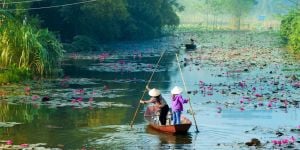 Sports activities in Hanoi
Sports activities in HanoiWe know there's a lot of attention on the drinking culture in Hanoi, but what about the options for a healthy ...
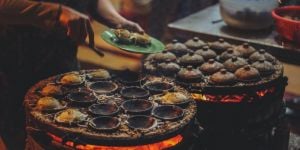 The food scene in Hanoi
The food scene in HanoiA foodie's utopia, Hanoi is not only the capital of Vietnam but also a fierce contender for the best cuisine ...
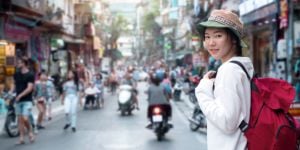 Things to in Hanoi alone, with your partner or with friends
Things to in Hanoi alone, with your partner or with friendsAt first glance, the Hanoi Old Quarter is overwhelming. A pool of bodies, young and old, loud music, and people ...
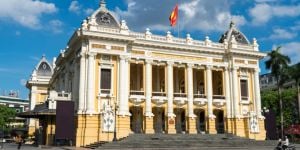 Things to do on weekdays in Hanoi
Things to do on weekdays in HanoiHanoi has an attraction to suit every taste and budget. From bustling marketplaces to beautiful murals, Hanoi ...
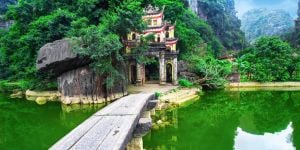 Leisure in Vietnam
Leisure in VietnamIf you are looking for an affordable destination with beautiful landscapes, culture, and delicious cuisine, ...
 Sports in Vietnam
Sports in VietnamA wide range of sports and recreational activities are available to locals and expatriates in Vietnam. Gyms, ...
 Explore Phu Quoc
Explore Phu QuocLocated in the very southwest of Vietnam, Phu Quoc Island, also known as Pearl Island, forms part of the Kien ...
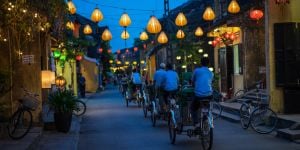 Hoi An: The Historic City
Hoi An: The Historic CityLocated in the province of Quang Nam, a short 30km South of Da Nang, Hoi An is a very popular tourist destination ...
Find more topics on the Hanoi forum



